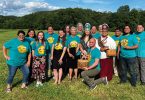
(Inset) Co-CEO Zane Adams; (Main) Founders Jeannine Buscher and Sarah Schomber
By Emma Castleberry
For the team at Buchi, it’s about more than making great-tasting, finely crafted kombucha and kefir soda. It’s about ending food waste and scarcity, and supporting a sustainable local food ecosystem.
Founding team Zane Adams, Jeannine Buscher and Sarah Schomber were friends before they were business partners. In the early days of Buchi, the trio lived and worked on Herb Mountain Farms, a tract of conservation woodland owned by Hart Squire. “We really were just recipients of living on an incredible piece of land that both grew food and protected its woodlands,” says Adams. “The benefit of living on Herb Mountain Farms for six years allowed us to really tend to each other and the business. I truly believe that living and working on the farm and conservation woodland was the driving reason why we hit success so early in our journey.”

Fire Kombucha. Photo courtesy of Buchi Brewery
It wasn’t always easy—at one point the trio was sleeping on the loading dock—but it paid off in 2016, when they opened the Southeast’s first commercial kombucha brewery in Marshall. “As we continue to grow,” says Adams, “we remain forever committed to brewing the highest quality living drinks, filled with flavor and purpose—and to using our business as a conduit for positive social impact.”
In 2020, the Buchi founding team organized FedUp Foods, a Public Benefit Corporation (PBC). A PBC is a for-profit corporate entity that includes a positive impact on society, workers, the community and the environment as part of its interests. FedUp is now the holding company for Buchi. “The vision of Fedup Foods is grounded by the idea that we can help solve food scarcity and insecurity by creating more access for all by using nutrient-dense ingredients in products at the level of scale,” says Buscher. “Our thesis is simple: if we can use good ingredients, manufacture food with those ingredients for store brands like Harvest Farms (we don’t manufacture for Ingles) at prices people can afford, many more people could have access to good, whole food. We now have a platform that reaches nationally versus just our local area while supporting more regenerative farmer partners.”

Photo courtesy of Buchi Brewery
This focus on regenerative supply chains, rather than extractive farming practices, has always defined Buchi’s approach. This is exemplified by the “closed-loop sugarcane partner,” whose growth, production and shipping is 100-percent carbon neutral. In contrast, traditional sugarcane farming results in pollution, habitat loss, industrial waste and deforestation. (World Wildlife Fund) “If we continue to use traditional extractive farming methods we will run out of food and destroy the viable land and soil necessary to grow that food,” says Buscher. Buchi also chooses its suppliers carefully, prioritizing those that are socially and environmentally responsible, independent, woman- and minority-owned, and within 150 miles of the brewery whenever possible.
Buchi meets each of these social and environmental standards without sacrificing on flavor and quality. It is also one of the only beverage brands that follows the traditional method of open-air fermentation, which allows for a symbiotic colony of bacteria and yeast. “Buchi is distinct because our drinks are raw, unpasteurized and feature a full spectrum of live and active cultures to boost and balance your gut microbiome,” says Schomber. “Food is life and our recipes bring together thoughtful curation and approachable combinations that taste good.”
For more information, follow @drinkbuchi on Instagram or visit DrinkBuchi.com.






